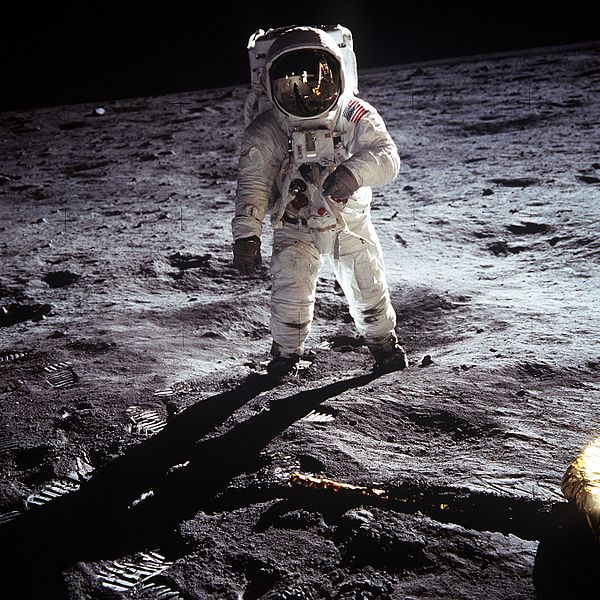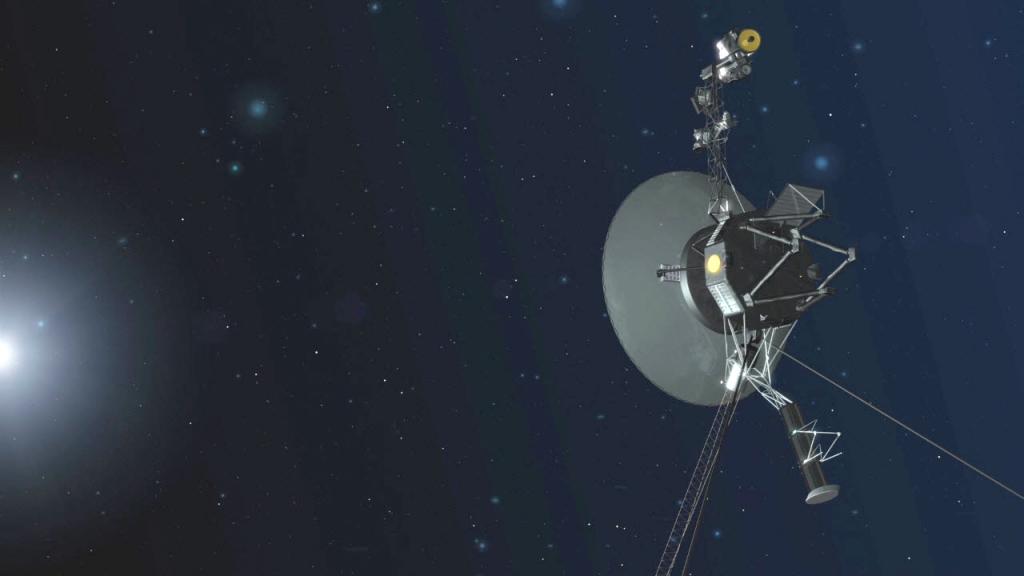This week we celebrate the 50th anniversary of one of humankind’s greatest achievements.
Go outside, look up at the moon, and consider this: it is not just a light in the sky, but a place, a place where human beings have walked. When we work together, we can do such tremendous things as send explorers to a rock 250,000 miles away. That is amazing and wonderful.
While history focuses on the handful of astronauts who went to the moon, their journeys were the result of years of work by thousands of people. I have heard a story — and I can’t track it down, so I don’t claim it’s literally true — that one of the Apollo 11 astronauts was touring the launch pad in the nervous days before the mission, and asked a technician, “Do you thing this is really going to work?” “I don’t know,” the tech said, “but if it doesn’t, it won’t be because I didn’t do my job.” Which is a pretty good statement.
But we should not lose track of the real reason we went to the moon: it was a dick-measuring contest with the USSR.
Of course a Cold War dick-measuring contest to send humans into space was a hell of a lot better than a hot, probably nuclear, war between the US and the USSR. So let me not seem to be complaining overmuch.
That said, it’s long past time to deflate the mythology that JFK had a selfless humanitarian motive in sending Americans to the moon, and got the population of the US and the world to support his vision with bold rhetoric. Kennedy, in his own words, was “not that interested in space” beyond beating the Russians to the moon. And polls showed that only about four in ten Americans supported the program.[Fishman]
Many of them saw the program as a waste of resources. This was a view common in the civil rights movement. In 1966, Martin Luther King noted that “in a few years we can be assured that we will set a man on the moon and with an adequate telescope he will be able to see the slums on Earth with their intensified congestion, decay and turbulence.” Reverend Ralph Abernathy led a civil rights protest at Cape Kennedy just before the launch of the Apollo 11, saying “We may go on from this day to Mars and to Jupiter and even to the heavens beyond, but as long as racism, poverty and hunger and war prevail on the Earth, we as a civilised nation have failed.”[Smith]
As the poet Gil Scott-Heron put it in “Whitey on the Moon”:
A rat done bit my sister Nell.
(with Whitey on the moon)
Her face and arms began to swell.
(and Whitey’s on the moon)
I can’t pay no doctor bill.
(but Whitey’s on the moon)
Ten years from now I’ll be paying still.
(while Whitey’s on the moon)
Friends, I grew up on science fiction, and as a kid imagined I might be the first to step foot on Mars. For a long time I argued that we should have a permanent scientific base on the moon, and favored an international manned mission to Mars.
So it pains me to say this, but it’s true: beyond Earth orbit, space is for robots and not for humans — at least for the next century or two, until we have solved the fundamental problems of living on the homeworld.
We have only a short time to put human civilization on a sustainable path or face a terrible crash, and our resources should not be wasted putting humans into deep space.
This is not an argument for cutting space exploration; there is a lot that can and must be done in space to further our understanding of the universe. Better understanding of other planets is vital to our better to understanding of the Earth. But robotic missions deliver orders of magnitude more knowledge for our investment.
And it may be that part of the solution to sustainability involves work being done by humans in Earth orbit; while they are long shots, projects like orbital photo-voltaic power may be part of the solution.
Asteroid mining is another often-cited possibility — though it seems to me that recyclcing and reclamation of Earthly resources is far more sensible, and that asteroid mining has more to do with romantic notions from American science fiction about a frontier-like culture in space than with serious ideas about resource extraction. In any event if we do mine asteroids, it will be done mostly by robots, with perhaps some humans involved in processing in Earth orbit. Sorry Larry Niven fans, but “Belters” are not going to be a thing.
There are three other arguments usually offered in defense of sending humans into deep space:
Putting humans in space pushes technological progress forward. In my collection I have a copy of Spinoff 1978, a NASA report (and yes, I’ve had it since the 70s, I do not follow Marie Kondo) promoting the benefits of space science to the average American. It claimed that “NASA technology has been transferred to medicine, transportation, public safety, industrial processes, pollution control, energy /systems, construction, law enforcement, communications, home appliances, farm machinery, sports and recreation,” and argued that these “spinoffs” were a “stimulating influence on the national technological progress , hence a valuable contribution to the U.S. economy.”[Mogavero]
But if progress in medicine, transportation, etcetera, is the goal, it would be better realized by direct investment in research in those areas. The benefits of spinoffs are a very poor argument for sending humans into space — at best a secondary justification.
We need to establish human presence on multiple planets in order to ensure the survival of the species. For example, insane billionaire Elon Musk has claimed that a Mars colony could preserve human culture in case of climate change, World War III, or runaway artificial intelligence.[Statt]
But absolutely nothing that could happen on Earth in the next few centuries could render it as inhospitable to human life as the surface of Mars is. If we want to build some sort of preserve for human civilization, redoubts on earth are a much more sensible option. We already have facilities such as Raven Rock, not merely a bunker but a city under a mountain in Pennsylvania built during the Cold War and restarted and expanded after 9/11.[Gross]
The extreme long shot of building a Mars colony diverts resources that could be used to prevent or mitigate global catastrophe in the first place. And if our disaster preparation is to include some sort of “backup” for human civilization it would be much cheaper (and more useful in the event of a disaster) to build it as a heavily fortified and isolated installation on Earth — even under the sea would be more hospitable and easier than Mars.
Space exploration gives humankind needed inspiration. This is basically arguing for manned space exploration as a form of performance art. And when you are in a deep crisis, that is not the time to fund a huge art project — especially not one in which only a few people can participate. Let’s focus on how saving the biosphere can be an inspirational art project in which we can all participate.
Look, I want humankind to go into space as much as anyone. It’s a beautiful idea, and in the long term it may indeed be our destiny to help spread life from Earth to the other planets — to be Gaia’s reproductive organs.
But if we were to spread life to other planets just to wipe it out because we never learned to live sustainably, that would be a tragic farce. First we get our shit together, then we go to the stars.
For the next century or two or five, humanity’s work is here on Earth. Space is for robots.
References
Fishman, Charles. “What You Didn’t Know About the Apollo 11 Mission.” Smithsonian Magazine, June 2019. https://www.smithsonianmag.com/science-nature/what-you-didnt-know-about-apollo-11-mission-fifty-years-ago-180972165/
Gross, Terry. “In The Event Of Attack, Here’s How The Government Plans ‘To Save Itself'”. Fresh Air. 21 June 2017 https://www.npr.org/2017/06/21/533711528/in-the-event-of-attack-heres-how-the-government-plans-to-save-itself
Mogavero, Louis. “Introduction”. in Haggerty, James. Spinoff 1978 National Aeronautics and Space Administration, Office of Space and Terrestrial Applications, Technology Utilization Division, January 1978
Smith, David. “‘Whitey’s on the moon’: why Apollo 11 looked so different to black America.” The Guardian. 14 Jul 2019. https://www.theguardian.com/science/2019/jul/14/apollo-11-civil-rights-black-america-moon
Statt, Nick. “Elon Musk still thinks a Mars colony will save us from a future dark age.” The Verge. 11 Mar 2018. https://www.theverge.com/2018/3/11/17106910/elon-musk-ai-threat-mars-moon-colonization-nukes-sxsw-2018
Image credits: Voyager 2 artist’s conception, NASA image via https://www.arnold.af.mil/News/Article-Display/Article/1286829/team-aedc-joins-in-recognizing-40th-anniversary-of-the-launch-of-nasa-voyager-1/; Buzz Aldrin on the moon, NASA image via Wikipedia https://en.wikipedia.org/wiki/File:Aldrin_Apollo_11.jpg



















